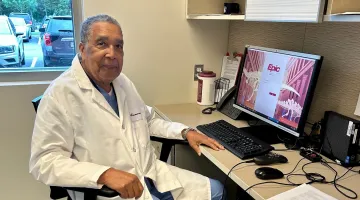Five Things to Look for When Choosing a Total Joint Replacement Surgeon
Author

Michael Ayers, MD, Orthopedic Surgeon
If chronic knee or hip pain has been ruling your life, total joint replacement surgery is a major step toward getting you back to an active lifestyle free from pain.
Despite the overall success rate for most patients, a hip or knee replacement is still a major surgery and requires careful planning. Part of this planning means having complete confidence in the surgeon you choose.
The following are five key things you should look for when choosing a total joint replacement surgeon:
- Experience and expertise. Review the surgeon’s education and credentials including their fellowship training—all of which is available online. Find out if they are board-certified and by what association. If you are interviewing surgeons, ask how many years he or she has been in practice and how many of these joint-specific procedures they’ve performed in the past year. If the surgeon has performed many procedures similar to the one you need, it often equates to a highly qualified team both familiar with your problems and needs and also active in using the most innovative equipment available to optimize your results.
- Accessibility. You will have many questions and concerns about your hip or knee replacement surgery, so it’s important you feel confident you always have easy access to your doctor and joint replacement team. Whether it’s a last minute question or concern before your surgery, or unexpected issues that crop up after the procedure, a good surgeon and team should be easily accessible. If it is difficult to get access before the surgery, it’s a good indicator that things won’t be any easier afterwards when you may have an even greater sense of urgency.
- Reputation and accreditations. Your surgeon works with a team of health care providers at either a hospital or outpatient surgical center or both. It is important that the facility is a well-respected center of excellence with a top local and/or national reputation for providing excellent joint replacement care. All of this information can be found by visiting the health care facility’s website or searching for information online.
- Effective communication. The relationship with a doctor is a very personal one, built on communication and trust. You must be able to trust, confide in, and tell your doctor about your health concerns and symptoms without hesitation. Particularly when it comes to orthopedic issues, patients have different reasons for seeking a certain procedure and along with that come a different set of expectations. It may be as specific as wanting to get back to a particular sporting activity at an elite level of competition, or as basic as just wanting to be free of daily agony or discomfort. Communicating that to your doctor is important, as it will shape the way he makes decisions both before and during your surgery. You should be confident that the doctor you choose wants to get to know you and the specific results you desire.
- Patience. Above all, remember, you are the decision-maker. Don’t make a choice and move forward with surgery until you feel completely comfortable and confident with the surgeon and procedure. Don’t be afraid to ask lots of questions in the process and don’t choose a surgeon who isn’t comfortable with a lot of questions. Your optimal health depends on it.
Michael Ayers, MD, is an experienced orthopedic surgeon specializing in hip and knee replacement surgery at South Shore Hospital. He practices at South Shore Orthopedics, located in the outpatient Center for Orthopedics, Spine and Sports Medicine at 2 Pond Park Road in Hingham.
Learn more about Total Joint Replacement at South Shore Health.
Author

Michael Ayers, MD, Orthopedic Surgeon






